#and you know in visual novel settings. whatever choice you make really determines what happens later on
Explore tagged Tumblr posts
Text

a lesson on good karma digimon survive week 2024 day 4: supporting characters
#digimon#gomamon#digimon survive#survive week#survive week 2024#rambling ahead. you don't have to read the tags beyond bc there's nothing that important tbh... you can just look at the art...#exhausted from being out and doing housework yesterday. then got a last-minute job with very urgent deadline today#finished everything but yeah basically i did anything but art so#irl do be like that aint it#anyway it's been a long time since i played survive and my memory isn't that good#but i always remember the part where we had to protect the gomamon#and later they showed us a path via the dam allowing the team to continue exploring#it reminded me of just how important it is to be nice and do good things whenever and wherever possible#and be mindful with the not-so-good things you do and say#be it good or bad. karma is real even if you don't know when it will get back at you#and you know in visual novel settings. whatever choice you make really determines what happens later on#yeah believe it or not i end up thinking stuff like that by helping a bunch of adorable seal mons...#mmm i'm officially behind now so i might as well take my time while also rest a bit haha ;;#this week has been fun with survive week tho fr. even though i came in unprepared (when will i change)#gotta keep surviving#png
184 notes
·
View notes
Note
HIIII I wanted to ask a more technical question related to the game. I know in another ask I think you mentioned that the ending you get in chaper 1 would determine where the story goes in chapter 2, but I was curious if individual/specific choices from chapter 1 would make a difference or effect anything like a bit of dialogue in chapter 2.
Like for example in Oleanders route you pick a trinket and that can effect a few lines of dialogue later. Will some choices like that carry on into other chapters? Tho I'd totally understand if not since it'd probably get too complicated to do stuff like that ^^
I really hope this isn't spoiler territory. I tried my best not to do that ><
The short answer is yes! Choices you make in chapter one can absolutely be referenced or have ongoing effects in later chapters. For anyone who has never programmed before, I'll explain a little about how choices work under the read more and show some examples of Obscura code, but the simple version is that it's only a little more work to include stuff like this: a line of code and then whatever the extra/alternative dialogue is.
So!! If you've never programmed before, the word you'll want to know is variable. A variable is basically just a box that contains information. In basically all visual novels any information the game needs to remember is stored in a variable. And in Ren'py games, it is very easy to make and use variables for a lot of stuff!
Your protagonist's name, for example, is put in a variable box labelled "Name", and so we can just type [Name] in dialogue and Ren'py knows that what we're asking for is the contents of the "Name" variable box, so it just shows that. You can see us doing just that in the first line of this code screencap! So when you enter your name at the beginning of a playthrough, you're telling the game what information goes into the "Name" variable box.

(You can also see how we set variables here, with the "trust_keir" variable remembering if you said yes or no to trusting him, and if you say no then he gets one point added to his affection score.)
Within a single playthrough/save file your variables stay the same until something in the code changes them, but starting a new game makes a new set of variables for that playthrough. That's why no matter how many new games you start and enter a different name into, your old saves will still have the name you entered there.
Since Chapter 2 is going to be a direct continuation of Chapter 1, you're still in the same save file and so all your variables just continue being used. And that means they're available for us to use for all sorts of things! Using variables can be complicated if there's a lot of them that interact in a lot of ways (ask me how a certain date scene is going!), but here's a pretty simple version.
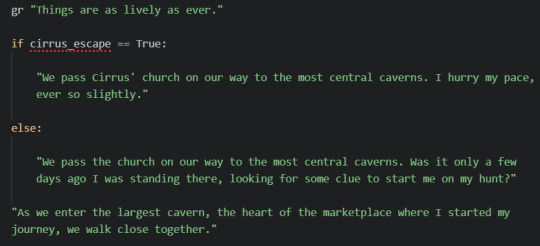
There's two ways onto Keir's route: you can get kidnapped by him normally, or Vesper can accidentally find a way into Mouse Hole after leaving Cirrus' route. If you do leave Cirrus' route, the variable "cirrus_escape" is set to True. That means that later on, I can program dialogue that will only be shown if you left Cirrus' route, in this case mentioning him by name while passing his church. There's a different line for players who didn't leave Cirrus' route. And we can do that with basically any variable in the script!
(For those who want a total breakdown, the screenshot above works like this:
First line: everyone sees this.
Second line: the code that tells the game only to show anything "inside" it (below and indented) if the player left Cirrus' route
Third line: the piece of script that's shown to players who left Cirrus' route
Fourth line: the piece of code that says "anyone who didn't get to see the third line get to see anything inside this"
Fifth line: the piece of script that's shown to players who didn't leave Cirrus' route
Sixth line: everyone sees this.)
So yes, there will be references to previous things that happened where they're appropriate! We love weaving references to things that happened before into the script, it makes everything feel more alive and responsive to your choices, even if those responses are individually pretty small.
107 notes
·
View notes
Text
A look at: Moon.
Writing reviews is always a learning experience for me, and one of the important things I’ve learned is that, sometimes, it’s pretty hard to write about certain individual games, visual novels, or such considering the kind of detail I like to go into. Therefore, this will be the first in a new series of mini reviews, or as mini as they get with me. Maybe there’s just not enough to a game to really give me details to dig into, or maybe it’s difficult to talk about without giving away more than I wish, or maybe there’s just something related to it that I’m more interested in talking about than the actual product; whatever the reason, these will hopefully be less rambly and excessive than my usual reviews, while still giving enough of an overview that they stand as proper reviews on their own. Either way, the subject of this post is an old, obscure visual novel from 1997 with a bit of history to it, called Moon.
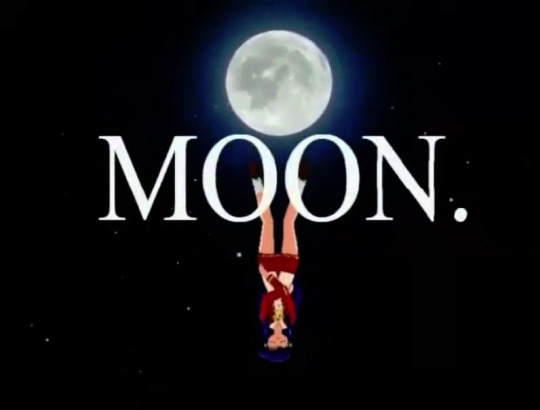
Moon was developed by Tactics, a humble developer of adult visual novels, and was the second one developed by them, with the first, Dōsei, seemingly just being, well, a plain H-game, and the third, One ~To the Radiant Season~, while still obscure, is actually fairly notable for being a prototype to Kanon in a lot of ways, as many key staff at Tactics would later break off to form Key afterwards, with them having also worked on Moon beforehand. Thus, Moon is in a very interesting spot when it comes to the progression of the developers that would change VNs as a genre with the release of Kanon, and that’s really the only reason I checked it out.
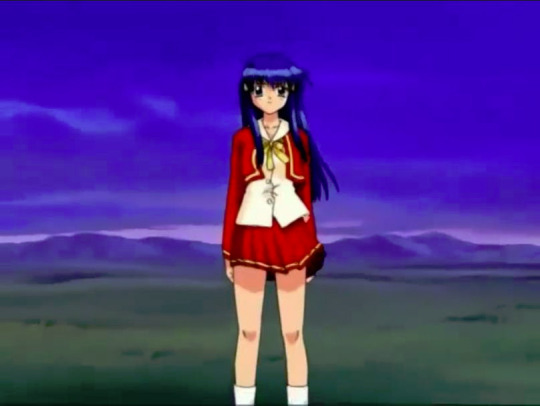
Moon follows Ikumi Amasawa, a girl who joins a mysterious organization called Fargo, which recruits others with the promise of acquiring an alleged “invisible strength” that can put one far ahead of ordinary humans, in order to investigate their possible connections to the murder of her mother, and if possible, take revenge on the ones responsible. Upon arriving at the Fargo facility, Ikumi quickly befriends two other initiates with ulterior motives of their own for joining: Haruka Mima, a determined girl with a cool attitude who keeps her goal to herself, and Yui Nakura, a cheerful, but naive girl who’s seeking to bring home her older sister, who joined Fargo several months prior. Though the three agree to become allies and help each other achieve their goals, they are quickly separated in different “classes” housed in different buildings, with Ikumi being assigned to Class A, the most prestigious of them all. Settling into her new life as a Fargo initiate, which mostly consists of “training” with the Minmes and Elpod, machines that confront her with various parts of her very troubled past for the purpose of “mental reinforcement” in the form of a vengeful doppelganger of herself, Ikumi gradually discovers many strange things about her situation, such as there only being one other member of Class A, that being Youko Kanuma, a quiet, cold woman who has been part of Fargo for many years. Additionally, Ikumi is forced to share her room with a strange boy who doesn’t volunteer his name, who, though part of Fargo itself, is quite low ranking, and more than a bit dim witted at times. Worst of all, upon finding a passage that allows her to access the buildings where her allies are kept, Ikumi finds that the other classes are subjected to horrific abuses by Fargo’s personnel in order to further their mental reinforcement. As Ikumi struggles to aid her allies however she can, the confrontations with her past begin to put a heavy strain on her mind, and the existence of the invisible strength Fargo claims to have starts to become more and more plausible.
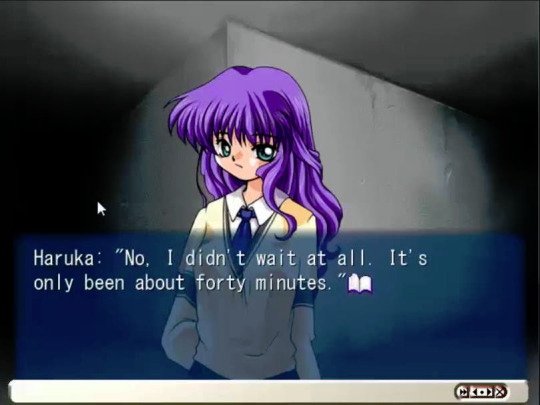
Needless to say, Moon isn’t exactly Clannad. I did not know much about this VN before I got into it, and finding it to be a psychological horror VN was a bit of a shock. Even more of a shock was just what form the majority of the horror came in. You see, even though One ~To the Radiant Season~, Kanon, and Air were all released as adult games, the h-scenes are very disconnected from the plot, most of the time, to the point of losing nothing from skipping them or even removing them from the game, and were pretty much just obligatory inclusions to help them sell better. From Clannad onward, most Key VNs have been clean to start. With Moon, on the other hand, you can’t go 5 minutes without running into some explicit scene, the main source being the Elpod sequences and the abuses the Fargo personnel inflict, and it wastes no time getting to them, at that. This is the biggest thing that drives off many of the few who go out of their way to experience Moon, and even with me having just watched an understandably censored playthrough of this on Youtube due to its shorter length, I almost quit very early into it, and definitely would have if I had actually played it. The Elpod is one thing, as the sequences are used for the purpose of developing Ikumi, but even then, most of them are just excessively disgusting more than disturbing, and that goes doubly for the sequences outside of it. Instead of really changing things up, they’re just content to get gradually more and more depraved, and outside of disgusting, the main thing I can even call them is repetitive. This is one of my biggest problems with Moon, and it was pretty hard for me to get into it because of it.
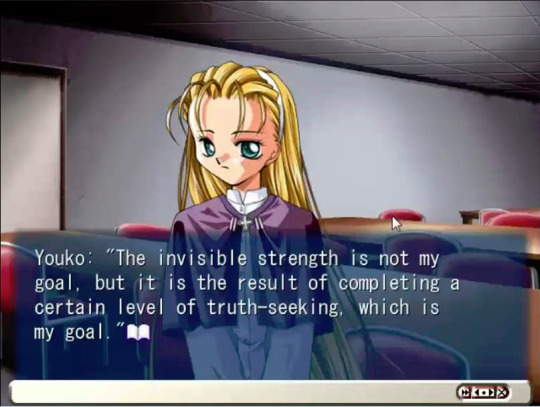
Another major problem I have with Moon is how it handles its cast. Moon is pretty short for a VN, only around 10 or 11 hours if you go straight for the true ending, and even though there are 7 endings in total, they don’t add much more time onto that, with two being worse variants on the true ending, and the rest being bad endings gotten through making bad choices. Having as small a cast as it does should naturally work fine with that, but they really aren’t balanced well. While Ikumi gets developed across the whole game, and Yui gets a good arc pretty early on, Haruka only gets a short arc that ends as quickly as it starts and doesn’t do a lot for her, Youko barely has any screentime despite establishing a good dynamic with Ikumi, and the boy doesn’t have much presence or relevance until late in the story. The pacing is just bizarre and rushed feeling.
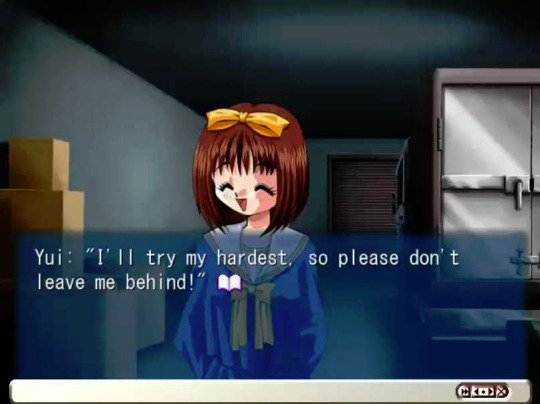
That’s not to say there aren’t a number of good points to Moon’s story. Ikumi is very well developed throughout the story, with the Minmes in particular leading to many melancholic scenes that make her quite sympathetic, and were definitely the high points of the normally rigid daily schedule much of the story takes place during for me. Despite the story’s flawed handling of some of them, the cast is still decent on a whole, with Youko’s gradually developing friendship with Ikumi and Yui’s development during her arc being some of the more memorable parts for me. The atmosphere is very well done, with the cramped, depressing corridors of the facility always feeling like they’re hiding something awful just around the corner, especially since you need to manually navigate the place using a map screen, and once the plot really kicks into high gear things become much more compelling, with the final days containing many high points in characterization and an infamous mindscrew of a sequence that, once looked back on with a more understanding eye, is actually quite fascinating in its own right.
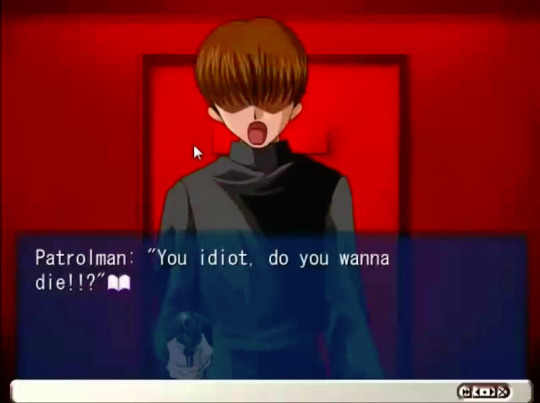
Visually, Moon’s art was done by Itaru Hinoue, the same artist as the majority of Key’s VNs, and it’s a lot rougher than the art of, say, Kanon. It’s not outright bad, but it looks very dated, with the designs and sprites not really sticking out. The CGs vary in quality, as some look pretty ridiculous, but others are quite good. Most impressive, though, is two animated intro sequences included in the DVD version, which happens to be the only version with an English patch anyway. They’re fairly brief, but do a great job of setting up the atmosphere and premise despite that.
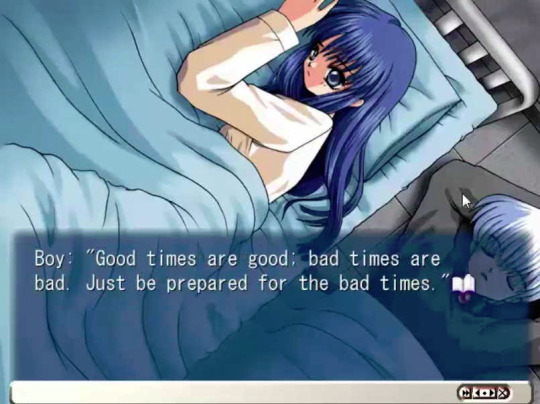
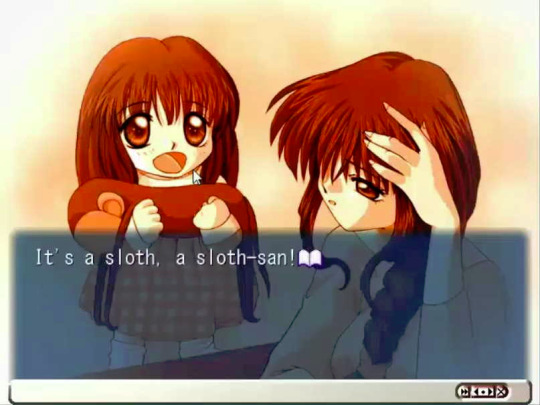
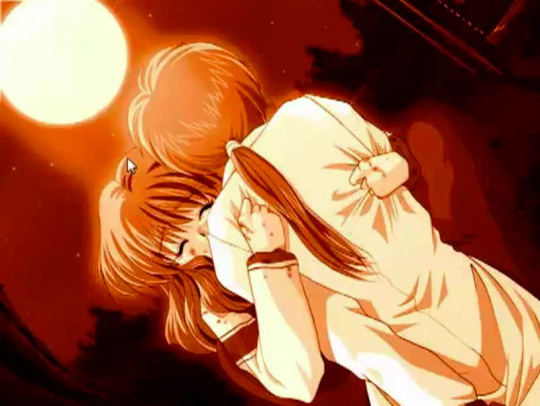
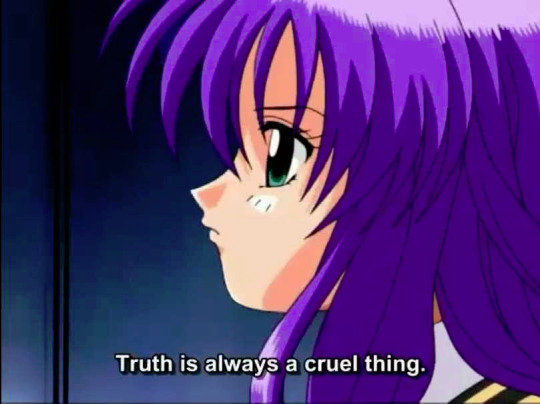
On the sound side, the soundtrack is great. It’s not a very big one, with only about 16 tracks, and the use of them can get a bit repetitive, but most of them are just a joy to listen to. From the electronic and tense Closed Space, to the wistful, yet peaceful The Place Where the Sun Shines, to Youko’s ethereal theme, to the credits theme, Sorrow, and especially the nostalgic music box theme, Memory, it’s worth looking up even if you hold no interest in the VN itself. There’s also voice acting, also added in the DVD version, and most of it is just average, with not many performances standing out, with the exception of Kahoru Sasajima as Ikumi, who delivers a very solid performance, especially during the more intense moments.
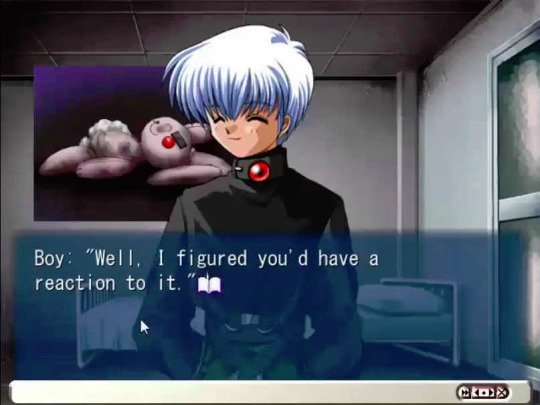
Overall, Moon can be a pretty hard sell. While I thought it was a decent experience by the end, its very offputting content, lack of similarity to any other Key works, and bleak atmosphere can make it pretty hard to go through even if you’re prepared for what’s to come. Even if you wanted a horror VN, there’s plenty others out there, like Chaos;Head and Chaos;Child, Higurashi: When They Cry, Wonderful Everyday, Raging Loop, or just about anything from nitro+. That said, if you can stick to the end, I definitely feel it becomes fairly satisfying, and when I got to thinking, I realized something that actually boosted my opinion quite a bit just by itself. As much as Moon is a story about cults and psychic powers with a somewhat unclear point to it all, it’s even more so just a story about a very troubled youth struggling with her grief, irrationally falling in with a bad crowd, and being forced to face her past and actions if she wishes to accomplish anything. Looking at the story that way, it’s actually quite well done, and going in with that in mind may even make it a bit more palatable. Still, I wouldn’t especially go out of my way to recommend it, and ultimately it’s still very far from being one of my favorite visual novels out there. Either way, that concludes my first mini review, which still turned out longer than I thought it would. My next post will be something unusual for me as well, but that’ll take a bit to come. Till next time. -Scout
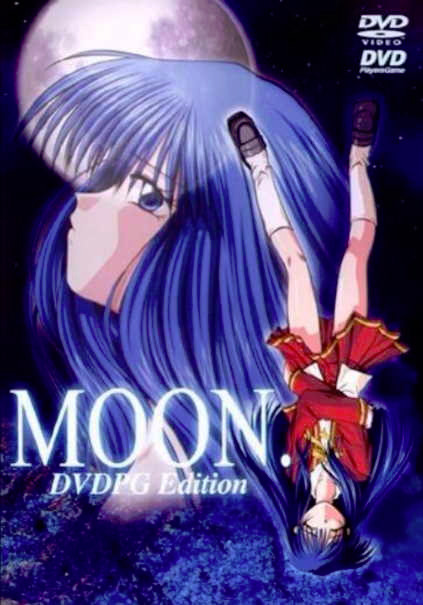
18 notes
·
View notes
Note
Hello, Icarus! Please infodump to me about Danganronpa?
okay so! I had written out a whole thing but then tumblr deleted it! so that was fun! /s but now that I know what I'm going to write it's much easier, so that's good 😌
n e ways, I'm gonna do like a basic timeline w explanations and some other stuff that hopefully I'll remember once I start writing!! so let's go :D
a list of everything danganronpa in chronological order (not the order that you should play/watch the stuff in, I'll put that in the explanations)
Danganronpa 3: The End of Hope's Peak High School - Despair Arc (DR3) - second anime, watch along with the Future and Hope arcs after playing the first two games (and UDG if you want to). backstory for the cast of the second game.
Danganronpa: Trigger Happy Havoc (THH) - first main game, play first. also has an anime that's basically the same as the game, but since there's not enough time to put everything from the game into the anime I definitely recommend playing the game. high school students from a prestigious school trapped in said school are forced to play a killing game, hijinks ensue.
Danganronpa Another Episode: Ultra Despair Girls (UDG) - third game, not main. play after playing the first two games. very different game mechanics from the main three, and widely considered not cannon by the fandom. I like it though, and it introduces a lot of really interesting characters along with giving a v underdeveloped character from the first game a lot more character development. it's not necessary to play it (though one of the characters plays a pretty big part in the third anime, so that would make more sense if you already knew her), but I think it's interesting and fun. there are also robot fights.
Danganronpa 2: Goodbye Despair (DR2 or SDR2) - second main game, play after playing the first game. same basic premise as the first game, except it's a different class (same school though) and this time they're on an island. even more hijinks and plot twists than the first game.
Super Danganronpa 2.5: Komaeda Nagito to Sekai no Hakaimono - (I could only find the Japanese title for this one, sorry 😔) kinda also part of the second anime? watch after playing the first two games (and UDG if you want) and watching DR3. character is woken up from a coma via overdramatic and overpowered other character.
Danganronpa 3: The End of Hope's Peak High School - Future and Hope Arcs (DR3) - second anime, watch along with the Despair arc after playing the first two games (and UDG if you want to). aftermath of the first two games.
Danganronpa V3: Killing Harmony (DRV3) - third main game, fourth game in total. I don't actually know when it happens bc they're v secretive about everything, so I'm just putting it last. play last. same premise as the first two, the class is trapped in a school with a courtyard and a huge sort of dome around everything. peak hijinks, too many plot twists to count.
woo!! that's the timeline as I know it, hopefully I didn't miss anything. and I have managed to remember what else I was going to say, so let's move on to section two:
the mechanics of the games
danganronpa is, at its core, a glorified visual novel. every character has a certain amount of sprites for when they talk, as well as voice lines that aren't usually the exact text on the screen but fit the vibe of whatever they're saying. and as I've said before, there's quite a lot of talking. these games have more plot than should really be possible and most or all of it is done through dialogue. cutscenes and class trials are the only parts that are reliably fully voice acted, but there are a lot of those.
as for the parts that are less visual novel-y: you can walk around, and the settings are pretty much as 3d as the 2d-ish style of the game allows. you can also click on things, and sometimes clicking on stuff will get you monocoins, the currency of the game, which means you'll be able to buy presents for the characters!!
"now why do I need presents for the characters?" you ask. well, that's because you're given a certain amount of free time each game to hang out with characters you want to get to know better! the game's ending is fixed, so you won't change the course of the game by who you do or don't hang out with, but you can learn more about characters and become closer to them! giving them presents they like makes them like you more :D
and the most exciting part of danganronpa, what a lot of people play the games for, the true lure of the game.... the class trials!!
so these characters are in a killing game, right? basically, they're faced with a sort of lose-lose predicament: stay trapped in the school forever, or kill one of your classmates to "graduate". but it's not as simple as that, because in order to graduate, you can't be caught. and how do you determine whether or not a criminal has been found out? well, a trial of course!
enter the class trials. every student (barring dead or severely wounded ones) is required to participate in a kind of mock trial- except someone's really dead, and they need to find the murderer or they'll all die too.
(right, did I forget to mention that? only one person can graduate. getting out alive insures that none of your classmates get the luxury of doing the same.)
so, yeah. the class trials are a true fight for life on both sides, because who ever loses will be executed.
and they're really, really fun.
entirely voice acted! enough minigames that the list of them is probably longer than this entire post! the joy of solving the mystery! the... execution, right in front of everyone.
hey, it's a dark game. not like they're trying to hide that. and the executions aren't actually all that gory most of the time, but they're still very much there and onscreen. also as close to fully animated as the games ever get, which is pretty cool.
so how the class trials work is this:
there's a murder. dun dun duuuun. you investigate everywhere related to the murder to get "truth bullets", which are the reason you don't immediately fail at the trials. you don't have to remember all of them, they're all written down in your e-handbook. plus, the protagonists all seem to have really good memories.
time for the actual class trial!! Monokuma (asshole bear running the killing game) introduces everything, explains the rules. and everyone starts talking.
there are a lot of different parts to the class trial, but most of it is "nonstop debates". everyone talks one after the other, and you have to find inconsistencies and shoot the right "weak spot" with the right truth bullet. you refute the lie or mistake and everyone goes back to arguing normally.
there's also hangman's gambit (weird hangman to find a key word), multiple choice things (self-explanatory), and plenty of others.
near the end of the trial (or sometimes only a little over halfway in, it varies), the killer will.... kind of become obvious. there's a specific kind of change in behavior that's the mark of the murderer in these games, but I'm not sure how to describe it exactly. a lot of times there's an accent change, and in general they start acting much more erratic. since it's a trial, though, even after this presents itself you still have to prove your case beyond reasonable doubt.
and once it's become clear to the killer that they're backed into a corner, you have to do the "bullet time battle". it goes by different names in different games, but the basic mechanics are the same: you battle against a student (usually the killer, but not always) in a rhythm-based battle where you have to click to the rhythm to refute your opponent's statements. once you've dealt enough damage, you shoot the final piece of evidence, and that's the end of it.
the murderers react differently different times. sometimes they break down and confess. sometimes they keep denying it. sometimes, they're just calm. however they act, though, the end is the same. they are caught and punished accordingly.
but before that, there's one more thing to do. the closing argument.
your final task is to explain how the murder was committed, from idea to execution (look, a pun! see I can be funny too 😌). and you have to do it... as a manga.
you don't have to draw the whole thing yourself ofc- you just have to fill in the missing panels and then watch as the protagonist narrates it to the rest of the class.
and that's all for the class trial, not counting the long talks after every execution while still in the courtroom.
wow, this is getting...... really, really long. there's only one more thing I'm gonna add, and I promise it will be much shorter than the other two bc it is late and I am officially Incredibly Fucking Tired.
with no further ado, a very short part three:
my general impression of the game. its vibes or smth, I dunno this is just what i think about it
when I first heard of danganronpa, I thought it was a horror game. I can now assure you that it is not. thriller? maybe. debatable. but definitely not horror.
and despite its extremely dark premise, this game is not all doom and gloom. there's so much stuff about hope, and overcoming despair even when it seems impossible... it's not exactly a happy game, but there's a lot more of that in there than you'd probably expect.
all in all, I love this game. so much. it means a lot to me, and I think it's a really good game. thanks for letting me talk about it so much asdhfd :D
#the turtle talks#icarus infodumps#danganronpa#i am so sorry#this is like an entire fucking essay lmao#it was so fun to write though#i will talk abt ocs next!!!#prolly not every day#bc as you can see#i tend to write A Lot#and that can be hard to keep up :(#but i will do it i promise!!!!!#never miss an opportunity to infodump abt them 😌#tysm for this ask!!#i never get to talk this much asdgfs#if you want to infodump abt anything to me pls do!!!!#/gen /pos#i love listening to people#talk abt stuff they love :D#long post
5 notes
·
View notes
Text
some meta thoughts
I was reading some meta by @crowleyraejepsen about Aziraphale’s neoliberalist tendencies (which is extremely interesting and everyone should check it out), and it got me thinking about the relationships between Heaven (and Hell) and Earth, and the relationships between angels and demons and humans, as presented in the book and in the show. Some of my thoughts are about the in-universe, world-building implications, and some of them are about the book’s function as a work of satire. So, here we go.
One of the big themes of the book is free will, and how important it is. It is, to a certain extent, what separates angels and demons from humans and what makes Adam centrally important. And I was always kind of confused about that, because angels and demons obviously make choices that go counter to their “nature.” Demons fall because of choices they make, and the idea that they’re predestined to fall is pretty… well it’s pretty dark. And I don’t think it’s really accurate within the world-building, even though there are branches of Christianity that go in for that sort of determinism. So the conclusion I came to today is that free will, in this sense, isn’t about the ability to make choices, but about how those choices affect a being and their relationship to different power hierarchies. Humans can make a whole myriad of choices about their own nature. A human can completely change their morality, their relationship to power, the way they live their life, etc., quite easily and in a very short span of time, without really affecting their spirit, for lack of a better word. There’s no divine retribution for changing allegiances, for humans, during their lifetime, and it’s implied that even once started down a path in a particular direction, they can still course-adjust at any time (take Hastur’s priest temptation, for example). But for an angel or a demon, those sorts of changes are literally and immediately catastrophic. And while there may be other options (as seen in Aziraphale and Crowley adopting a lot of human mannerisms and behavior patterns), the only real example either angels or demons have for “what happens when I change my relationship to power or morality” is the Fall.
From an in-universe perspective, I think it’s safe to say that no one can be sure that absolutely everything isn’t predestined. That’s why ineffability is mentioned so often, but it’s especially why (I think) it’s consistently mentioned by Aziraphale, and also possibly why Aziraphale collects books of prophecy. Because prophecy represents a potential insight into ineffability, and because, for Aziraphale, it’s entirely possible that literally everything, including which angels fall when, is predetermined and part of the Plan. But he can’t be entirely certain. He can’t know, for example, that he won’t fall if he makes a big enough change in himself. He can’t know that he’s not going to, no matter how many texts he collects. Not even Agnes can tell him. And so his relationship to the power and hierarchy of the universe becomes to defend and reinforce it, mostly out of fear. Fear that if he changes himself too much too quickly, if he questions the way things are going, he could very easily lose his entire sense of self. We can see this in his repeated assertions that he can’t question the Divine Plan, and his defense of Heaven’s tactics, despite any misgivings he might have on personal moral grounds (see, the Noah’s Ark scene and crucifixion in the show, the “freedom fighters” and guns discussions in the book, etc.). Anything is permissible, as long the right side is doing it.
Now, Crowely. From the book:
People couldn’t become truly holy, [Aziraphale] said, unless they also had the opportunity to be definitively wicked. Crowley had thought about this for some time and, around about 1023, had said, Hang on, that only works, right, if you start everyone off equal, okay? You can’t start someone off in a muddy shack in the middle of a war zone and expect them to do as well as someone born in a castle. Ah, Aziraphale had said, that’s the good bit. The lower you start, the more opportunities you have. Crowley had said, That's lunatic. No, said Aziraphale, it's ineffable.
Obviously, Crowley isn’t a fan of the Ineffable Plan, and I’d posit it’s precisely because he’s already fallen. Oh, everything is predestined but demons and humans still get punished? What sort of plan is that? A psychotic one, that’s what. And so it’s easier for him to challenge the idea of a Great Plan, even though it also challenges the power he is subject to in Hell’s hierarchy, because he’s more scared of immovable predestination (who is he, if even becoming a demon isn’t actually based on his choices?) than he is of retribution (though he is, admittedly, quite scared of retribution).
From the book:
“It’s not that I disagree with you,” said the angel as they plodded along the grass. “It’ just that I’m not allowed to disobey. You know that.” “Me too,” said Crowley. Aziraphale gave him a sidelong glance. “Oh, come now,” he said, “you’re a demon after all.” “Yeah, but my people are only in favor of disobedience in general terms. It’s specific disobedience they come down on heavily.” “Such as disobedience to themselves?” “You’ve got it. You’d be amazed. Or perhaps you wouldn’t be.”
This, in the same conversation where he’s trying to convince Aziraphale to help him interfere with Warlock’s upbringing. And then, after the fiasco of Warlock’s birthday party:
“You’ll be amazed at the kind of things they can do to you, down there,” he said. “I imagine they’re very similar to the sort of thing they can do to one up there,” said Aziraphale. “Come off it, your lot get ineffable mercy,” said Crowley sourly. “Yes? Did you ever visit Gomorrah?” “Sure,” said the demon. “There was this great little tavern where you could get these terrific fermented date-palm cocktails with nutmeg and crushed lemongrass—” “I meant afterwards.” “Oh.”
So from these bits I infer that both Crowley and Aziraphale are, somewhat, operating under a sort of low-grade fear a lot of the time (and we can relate this to queerness and otherness and marginalization in a lot of societies too, but that’s a whole other essay or three). Fear that the power structures they’re aligned with but don’t quite fit into ("I suppose--get off the road you clown--your people wouldn't consider--and the scooter you rode in on--giving me asylum?" / "I was going to ask you the same thing--Watch out for that pedestrian!") are going to topple down on them.
But what are those power structures, exactly?
One of the most interesting differences between the show and the books for me was actually the depiction of Heaven and Hell. In the book, I got the impression that they were both bureaucracies, but that Heaven was run more like a government military (with commanding officers and a very strict chain of command, etc, but the Final Authority is actually someone else) and Hell is more like feudalism, with its dukes and lords and, ultimately, king, or as an office environment, with the contract department, etc. Both have paperwork, but somehow it’s not quite as bad as human paperwork (Crowley had been extremely impressed with the warranties offered by the computer industry, and had in fact sent a bundle Below to the department that drew up the Immortal Soul agreements, with a yellow memo form attached just saying:“Learn, guys”).
But in the show, Heaven is depicted more like a large, abusive corporation where the CEO is just never around so you have a rich, overpaid management team running amok doing whatever they feel like to enforce their influence, and Hell is … I’m not really sure what Hell is because the visual design evokes post-apocalyptic dystopian psuedo-anarchy generally governed by corrupt oligarchy. There’s probably a better word for it that I’m missing. Lots of concrete and closed in spaces and visual markers for poverty and imprisonment (possibly because, contrary to more medieval ideas, modern Christian-dominated society tends to relate poverty with sin and criminality--and as Pratchett observed in the guard novels, owning a slum isn’t a crime, but living in one very nearly is). There’s not an official set power structure (presumably, anyone can advance if they gather enough influence), but there is a hierarchy all the same.
Stemming from both of those depictions is a really interesting (to me) tangled bit of world-building, because there is absolutely no explicit in-universe reason Heaven or Hell should be set up this way. Why are Heaven and Hell such strict hierarchies? Out-of-universe it’s likely because the authors needed that structure in order to actually criticize it. The book’s discussion of religion and Church philosophy is pretty firmly based in a Western interpretation of modern Christianity, which makes sense because that's what the authors have experienced, and it makes sense also that they’d update the show’s depictions to represent more present-day reflections. But if you start with Eden, there’s two whole millennia (half the Earth’s in-canon existence!) before Christianity is a thing at all. (I’m focusing on Christianity here because that’s what the book does.) Did Heaven and Hell look different in those early times? Did they change alongside humanity? Or did humanity change to resemble the shape of Heaven and Hell?
Obviously the latter option is the one the Church has leaned into throughout history, but my theory is that that Heaven and Hell changed in response to humans. Looking at both authors’ other depictions of religion, human belief probably plays a strong role in how the Good Omens universe is actually structured. Which means that human society shapes everything. We’re not actually looking at a top-down hierarchy from day one, we’re looking at a representation of the cosmos that is constantly in flux for four millennia. Which then makes me wonder: Were Crowley and Aziraphale less afraid before, say, the crucifixion of Christ? There is certainly a stark difference between Aziraphale saying “I must have put it down somewhere, forget my own head next” (re: flaming sword and said to actual God) and the business with lighting candles and trying to appeal to a Higher Authority and then ... not really arguing when the Metatron disagrees with him. Did Aziraphale have different moral standards around social inequality before the consolidation of the Church in the Middle Ages, when (potentially) European politics and religion intertwined so closely that the structure of maintaining power on Earth (feudalism) became the new shape of Heaven and Hell? Were there periods when the difference between angel and demon were less rigid? There were obviously periods when more of them showed up on Earth more often (Gomorrah, Christ’s birth, etc.). So what changed? Because something changed by the time the 15th century rolled around and Crowley was getting commendations for things he didn’t even know were happening (Spanish Inquisition, in the book).
My personal headcanon is that humans decided demons and angels didn’t come to Earth much anymore. They started writing doctrine about how divine will was actually executed through Earthly representatives, like popes, and priests, and kings, and fostered social mythology that evil could get into your head and make you do things, even without actual possession, and that made it so. Not just in the structure of Heaven and Hell, but even in the structure of angels’ and demons’ minds. “Oh, there’s nothing more for us to do, really, but wait for Armageddon. The Big One we’ve all been waiting for.” Earth just kinda hums along on its own. No more big displays of power from visitors on either side, just that careful craftsmanship of a soul, if you feel like it. But Aziraphale and Crowley are still on Earth because they’ve always been there, and they are, by definition, Earthly representatives; they’ve had to adapt already, and now they have to adapt faster. Between changes in doctrine and population explosions, they had to learn to use humans more effectively, which means they had to think more like humans, and, on a certain level, become more human. They had to develop imagination, and ended up developing other things as well; Crowley develops compassion and morals, and Aziraphale develops vices and guile.
And then we have Adam, human incarnate, who believes things on scales beyond even what whole societies can muster up. And he “knows all about” Aziraphale and Crowley. And he doesn’t want an apocalypse. And he thinks people should start doing better when they’re alive, instead of waiting until they’re dead to sort things out.
What do you think Heaven and Hell look like now? How does that knowing affect Aziraphale and Crowley? Are they more human, with more ability to change than ever before? Or less? Can Aziraphale actually still fall? Could Crowley be forgiven?
It’s a whole new universe, when Adam’s done with it. Anything could happen.
#good omens#good omens spoilers#aziraphale#crowley#gotvspoilers#meta#i really like playing with world building#please ask me about it at any time#long post
70 notes
·
View notes
Text
Idol Distractions
(This is also on AO3 if you’d prefer to read it there. Hope you enjoy this light and fluffy YohaMaru one-shot!)
“Wow, there’s so many… I don’t know how you go finishin’ all of these.”
“I haven’t finished them all. Honestly, I haven't even played them all. I used to get through everything, but now I have practice after school, I’m falling behind.”
Hanamaru continued looking through the games on Yoshiko’s shelf, occasionally picking out one that she liked the sound of and looking at the cover art. “Ain’t that a problem?”
“I don’t mind,” Yoshiko replied. “I used to play so much because I didn’t have anything else to do. Back in middle school, I didn’t really… I wasn’t popular.”
“Oh…”
“It’s okay. I mean, sometimes I’ve got people to play with now!”
“Yeah. I won’t be any good, though,” Hanamaru fretted.
“You’ve got as much chance as any mortal when faced with the unholy gaming powers of Yohane!”
Hanamaru briefly turned to stick her tongue out at the fallen angel, before going back to browsing the shelves. “This is weird, zura. When I normally look at someone else’s shelves they’re full of books, and I can get talkin’ about the ones I know. But I don’t really know any games…”
“It doesn’t really matter what you pick – I can show you how to play it. Just go for whatever you like.”
At that point, Hanamaru picked up something that caught her eye – a largely white box, with colourful shapes and lots of English text, and a cute blue animal on the front. “Can we play this one?”
Trust you, Zuramaru, thought Yoshiko. She wasn’t going to refuse her, of course. “Sure, I’ll just have to set up the machine.” Yoshiko went over to the cupboard and came back with a dusty box, from which she pulled out a black machine and a couple of black controllers. She struggled to get it to work with her TV briefly, and was about to give up when she saw the screen fade to black, then turn white.
“Se~ga!” rang out the sound from the TV.
“Wooooow! Mirai zura!”
“It’s not the future, Zuramaru,” laughed Yoshiko. “This thing was my dad’s. It’s older than we are, they stopped making them before we were born.” Still, Yoshiko couldn’t help but smile as she saw the sparkle in Hanamaru’s eyes. She kind of wished she had the same sense of constant wonder at the modern world – to be totally fascinated by things most people found mundane.
“Yoshiko, what were we studyin’ in history class earlier?”
“Ancient Egypt,” replied Yoshiko.
“And how long ago did Ramesses rule?”
“About 3,000 years ago. What’s your point?”
“How old is that games machine?”
“Uh, I think it’s about 30 years old.”
“So people have been around for thousands of years without this, and we’re lucky enough to live in a time when it exists? Mirai, zura.”
“Yeah, I guess that’s true,” Yoshiko conceded, considering that perhaps their outlooks on the world were both strange. “So this one’s really easy to play – that little guy is Sonic, and he’s got to run along to the right. If you press any of the buttons, he’ll jump.”
“Okay! So I press this one an’… oh hey, is that a friend?”
“Zuramaru, no–!”
“Aaaah! What happened?”
“Sorry, I really should have explained that better. You ran into a bad guy.”
“So that’s it?” asked Hanamaru, sadly.
“Don’t worry, you’ll get another try. Just try to grab those spinning rings you see, they’ll protect you if you get hit. And when you see any of those robots, just jump on top of them.”
“Okay! So I run this way… zura?! Was that an animal in there?”
Hanamaru guided Sonic through the dangers of Green Hill Zone’s first act safely, albeit considerably slower than it could have been done. Yoshiko spent more time watching Maru’s face than the screen – she was so cute when she scrunched her face up in concentration, and even cuter when she panicked at Sonic’s speed through the tunnels.
“Hey, pass me the controller,” said Yoshiko as the second stage began. “I’m gonna show you a secret.” Within seconds, Sonic was smashing through a wall. Hanamaru asked how to do a roll on the ground, and then spent the rest of the stage rolling into every single wall she could find to see if it would break. She kept doing it in the third stage and was thrilled when she finally found one, even if it took a couple of attempts to break all the way through. It was a performance befitting an amateur gamer, but she was having a good time. Finally, she reached the last part of Green Hill Zone.
“Yoshiko! Who’s that?!” asked Hanamaru anxiously, as a man in a flying machine entered the screen with a huge wrecking ball.
“That’s Eggman, he’s the villain who put all the animals in the robots.”
“He’s scarin’ me. You fight him!”
Yoshiko had no choice as the pad was thrust into her hands before she could so much as utter a word of encouragement, she made quick work of the simple boss. “Hey, do you wanna play a game together? I’ve got Sonic 2, it’s just like this but we can both play.”
“Okay! But how do we both be Sonic?”
“No, he’s got a little friend called Tails in this game. We can play together, or race against each other.”
“Oooh, can we race? Let’s race!” Hanamaru practically bounced up and down on the spot with excitement.
“Very well. But know that when you challenge Yohane, your fate is determined before you even press the start button!”
Hanamaru brushed off Yoshiko’s theatrics, instead focusing on the orange fox on screen. “Cute, zura! Can I play as him?”
“You’ll be Tails, yeah. He’s on the bottom bit of the screen. Oh yeah, so you should know, it’s not just finishing first that counts here. If you smash bad guys and TVs, and collect rings, they’ll help you win too.”
“I see…”
The stage started, and Tails started to walk away, only for Sonic to roll right past at a terrifying speed. “Are you cheatin’, Yoshiko?” said Hanamaru, putting on a pout. “Oh yeah, you can do that in this game,” Yoshiko said, only half apologetically. “If you hold down and press jump, you can charge up a spin and shoot off. You’ve gotta go fast, Zuramaru.”
Although Yoshiko wasn’t particularly familiar with the game, years of practice allowed her to tackle the stage with ease. Hanamaru hung back as Yoshiko sped through, knowing that she couldn’t compete in that way – instead she made sure to collect rings and break item boxes, hoping to win on those fronts. Yoshiko saw that she was doing this and tried to break a monitor herself, but everything suddenly went white…
“Z-zura? I won?!”
Yohane’s curse had struck again. The random item in the box was a teleport, placing Hanamaru right next to the finish line and Yoshiko right back near the start of the stage. Suddenly, she had seconds to make it back through the stage and grab as much as she could along the way. But she’d largely ignored rings and items in her earlier haste – could she pull it back?
Nope. There it was, plain as day.
“2P WINS”
“Wow, I’ve never won at one of these before! I thought you said you played these games a lot, Yoshiko?” Hanamaru couldn’t resist poking a little bit of fun at her friend, though in truth she didn’t quite understand how everything had just happened. “Do not be mistaken! Your victory was a matter of divine intervention,” Yoshiko responded, trying to save face. “Shall we play another round?” Hanamaru shook her head. “I think I’m retirin’ while I’m still undefeated. Besides, I was startin’ to wonder if we could get a drink.”
The two girls headed to the kitchen, and Yoshiko began to pick through the cupboard. “Coffee?”
“No thanks, I never got why everyone’s drinkin’ it all the time. It’s so bitter. I’d be happy with a glass of water, please.”
“Fancy, but I’ll push the boat out just for you,” Yoshiko confirmed with a wink, as she started boiling the kettle for her own coffee.
“You know, I’m really glad we could hang out like this.”
“Yeah, I’m having fun too,” said Yoshiko as she put down Hanamaru’s glass.
“No, I mean – what I’m tryin’ to say is that I’m pleased I could visit your home.”
“Oh, and why would that be?”
“Well, the temple… we don’t have video games or nothin’ like that at my place,” said Hanamaru. She let out a big sigh. “You’d be bored if you visited me.”
“Hanamaru, are you kidding me?” Yoshiko asked with unusual gravitas. “Do you really think I mind where he hang out?”
“Zura?”
Yoshiko decided it was time to use one of Hanamaru’s own tricks. “Where did we meet up before we come here today?”
“In the library,” she responded.”
“And how often have we hung out there?”
“I don’t know… I think I’d have lost count even if I was tryin’ to remember.”
“Now,” said Yoshiko with complete confidence, “how many times have you just walked in and found me there?”
“That never happ– oh…”
“Right. It doesn’t matter so much where we are, because what I’m interested in doing is spending time with you. And you’re not so into games, right?”
Hanamaru took a long sip from her glass. “Yeah. I know you love ’em though, so I like to make an effort.”
“Do you want to stop playing for the night, then? I’m happy to just chat like this.”
“No, just… is there an easy game we could try? One with a lotta story, where you don't have to do too much?”
“That’s a movie, Zuramaru,” Yoshiko joked. She was definitely an action gamer at heart, particularly racing games. “But now I think of it, there might be something…”
As the girls headed back to Yoshiko’s room, Yoshiko tried to think of a suitable game to put on. She didn’t have many visual novels. Well, there was that one she'd been playing that Riko had recommended… No! Yoshiko didn’t want to come across as weird. Honestly, Mari had never hidden her thirst, but Riko was a surprise. Who’d have thought that Yohane would be the purest member of Guilty Kiss?
“Whatcha thinkin’, Yoshiko?”
“A-ahhh haha… nothing!” Yoshiko had gotten wrapped up and totally missed the development of that awkward silence. “Hey, I haven’t started this one yet. Shall we try it? It’s a bit sci-fi but it’s more or less the sort of game you wanted.”
“Looks good, zura,” Hanamaru confirmed. “Hey, would you mind if I rested my head on your shoulder while we read it? I’m not used to stayin’ up so late.”
“S-sure,” said Yoshiko, turning her rapidly reddening face towards the wall as the game loaded.
The game began, and the player character started ranting about being a mad scientist chased by some organisation. “Hey, this guy’s funny,” said Hanamaru, giving Yoshiko a little nudge. “He kind of reminds me of you.” Hanamaru meant it affectionately, so it was fortunate that she didn’t turn her head – or else she’d have seen Yoshiko’s accusatory glare. Yohane was nothing like Hououin Kyouma! “The girl’s cute, though.”
“Right? She’s sweet and innocent… Really, I quite like characters like that.”
Hanamaru just gave a contented little “Mm” as the story continued apace. The characters went to get capsule toys on the way to some scientific press conference, then argued with a teenage genius, only to find her dead minutes later. “Hey, Zuramaru, let me know if you get scared, alright?” No response.
Yoshiko looked down to see Hanamaru softly sleeping, still propped up against her for comfort. Clearly, she hadn’t been kidding about not being used to late nights. But they’d had a fun night together, and besides, she looked so cute that Yoshiko could hardly be mad. She turned the console off and switched over to the TV, then carefully shifted to a more comfortable position.
This, she thought to herself, was something she could get used to.
17 notes
·
View notes
Text
More Short Reviews of Short VNs
My latest recommendations for visual novels that take a few hours or less to read. This installment features baseball, magic trees, international espionage, alcoholism, and the actual devil. Well, maybe it was really a metaphorical devil—it’s kind of ambiguous.
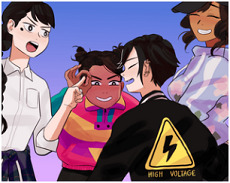
Butterfly Soup [VNDB|itch.io]
Butterfly Soup is about four gay and bi Asian girls going to school, playing baseball, and getting up to all kinds of silly shenanigans. It touches on some serious issues, many of them tying into the struggle of defining your identity as you grow up, but it’s also full of comedy and adorable awkward flirting. The over-the-top, internet-meme-influenced style of humour might be a bit much for some readers, but it’s realistic for the fourteen-year-old protagonists. I would have liked to see some of the characters developed further, but I was content to just get a small glimpse of their lives, with what happens in the future left up to interpretation . . . at least until the sequel the developer has mentioned she’s planning on her blog!

Natural - Beyond Nature - [VNDB|Steam]
If you enjoy short, atmospheric VNs, I highly recommend Natural - Beyond Nature -. This bittersweet tale of two young women bound together by both magic and trauma, and the visitor to their remote village who might be able to help them, is a lovely relaxing read. You might want to keep the official guide on hand to make sure you collect all the “fragments” that unlock the endings and bonus content, since the skip function requires you to constantly hold down the button, making a bit frustrating to try to explore all the options yourself. But it’s worth it to see all the pretty art in the ending variations. And I’m always happy to support indie VN developers like Zeiva Inc., who seem dedicated to improving their writing and experimenting with new concepts.
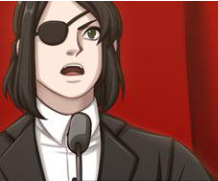
Blind Men [VNDB|itch.io|Steam]
In the BL/comedy VN Blind Men, aspiring supervillain “Doctor Cyclops” is determined to pull off an impressive heist in order to gain a spot in the League of Evil. Unfortunately for him, his plan is disrupted by not one but two secret agents—a flamboyant American and a stoic Russian. As he struggles to pull off his evil scheme, Cyclops might just end up falling for one of his enemies. Blind Men has a bright and colourful art style that really sets it apart from a lot of other VNs—it reminded me more of the TV show Archer than anything else. I had some technical issues with the skip function and the steam achievements, but I really enjoyed the story, which manages to fit some really cute and interesting dialogue in between scenes of comedy and parodic melodrama. It’s another one that I kind of wished was a little longer, since it would be great to see more interactions between Cyclops and either love interest as they continue to work against each other despite being attracted each other. I’m looking forward to seeing what these developers come up with next.

Last Call [VNDB|itch.io]
Last Call’s protagonist, Dawn, wakes up after having fallen asleep in a bar, with no money for a taxi and no charge for her phone. She only has two phone numbers memorized, and both of them belong to people she’s somewhat estranged from after rocky relationships. Whichever number you choose to ask the bartender to call, the story explores some relatable issues through realistic dialogue, and your choices determine whether Dawn moves toward reconciliation or makes things worse. I felt like the writers did an especially good job making Dawn a sympathetic character, in spite of her many flaws and past mistakes. It can be a little difficult to figure out how to get some of the endings—a few of them seem to require getting some of the other endings in a specific order—but a list of them gives a few hints, and I do appreciate the originality of the non-standard route structure. The nice unique art style also adds to the appeal of this very polished exploration of friendship and forgiveness.

We Know the Devil [VNDB|Steam]
An earlier release by the developers of Hustle Cat, We Know the Devil explores the relationships of three teenage friends as they spend a long, strange night in a dilapidated cabin at a Christian summer camp. The art style of sketched sprites over photographic backgrounds might not be for everyone, but I felt that it added to the story’s odd and unsettling atmosphere. The story combines horror and teen angst with plenty of symbolism and mythological references into a weird and experimental work that’s very interesting to read. Furthermore, the contrast between WKTD and Hustle Cat shows that Date Nighto is a group of developers with a lot of versatility. What kind of story they’ll tell next is anyone’s guess, but I bet whatever it is will be fun.
#visual novels#visual novel review#visual novel reviews#butterfly soup#we know the devil#last call#blind men#natural beyond nature
75 notes
·
View notes
Text
By Chance, Part 2 - Drake x MC (A Royal Romance Mini-Fanfic Series)
[A little note: Took me a little time but here’s another piece of the Drake x MC AU I’ve been working on. I don’t know how well this is going to go since it’s setting up into a sort of slow burn romance. This was originally more than twice as long but then I realized it was better to divide it instead of posting something over 8 pages single spaced so without further ado...here’s part 2! And if you haven’t read part 1 - here’s a link to it.]
[Summary: Drake knew he should have probably gotten rid of her phone the moment he found it. Between Liam’s impending bachelor party and what awaited them back in Cordonia, he didn’t have time to track her down. But something kept stopping him.]
Trouvaille; something lovely discovered by chance.

Drake glanced at the phone with passing fascination. Resting above the coffee table, his eyes were inadvertently drawn to it. It’s dark purple casing, its flashing blue light every so often; both were testing his curiosity as well as his patience.
After retrieving the phone and dropping it by the end table of his room; he had forgotten its existence until Saturday evening. While he was waiting for his friends to get dressed for Liam’s bachelor party; he had simply ran out of things to occupy his time.
He paced around the room, trying to decide what to do with it. On one hand he figured he should probably toss it, and probably forget about it. It was the easiest solution and required the least amount of effort. It didn’t matter to him but as he reached for it, he sighed. It might not mean anything to him but it would certainly mean a whole lot more to the woman that had lost it.
He dropped it back onto the table, and walked in circles.
He wondered if he should use this time to take a look. Only a look, he told himself strictly. He didn’t fancy intruding in other people’s business, let alone cared to.
Torn between forgetting the phone entirely, and finding its owner; he ran his fingers through his hair in exasperation.
What was the harm in peeking? His conscience reasoned and if he had any intention of finding the American woman, he had to at least know a few things about her.
He was surprised by the lack of lock as he swiped to the screen. Immediately he was bombarded by a selfie with what looked like; as he squinted - a picture of her and her cat.
Now that he had a better look of her, she was pretty. The dark hair that cascaded across slender shoulders and mocha skin that belonged in the sun, the expressive dark eyes – she was pretty but nothing more. Definitely not the worldly pretty he was accustomed to seeing in Cordonia. She had striking features though, that could make any man look twice.
He studied her carefree expression, the smile in her eyes a little longer than he probably should have before sifting through her apps. A person could tell a lot about someone by the type of things they downloaded. Most of them were unrecognizable to him as he never understood the fascination with social networks, or visual novels. His eyes paused by a particular application choices stories you play – before a number lit the screen.
It was marked as “Mom” and he had almost answered out of reflex. He waited until the number disappeared to utter a sigh of relief. He would have had a hard time explaining to the woman’s mother why a stranger had this phone.
A knock on the door broke his focus. He dropped the phone by the table again and went to answer it.
He knew exactly who it was before he saw him. His best friend Liam beamed a smile before giving him a shoulder hug. “Hey, you’re the one celebrating tonight not me.” But Liam’s enthusiasm was infectious.
After he releasing him, Liam stepped aside to let the others in, Tariq and Maxwell the rest of their party. They were both dressed in suits except Maxwell had tucked his blazer under his arm.
Drake glanced self-consciously at his own clothes thinking he might have under dressed for whatever night they had planned. He hadn’t really asked.
Liam didn’t seem to mind or noticed as he leaned comfortably by the kitchen counter. Maxwell had flopped into one of the sofas and Tariq remained standing, awkwardly by the door.
“We going out or what?” Tariq asked, eyeing his watch.
“That’s not how we greet friends.” Liam chided, before Drake had the chance to answer. He turned to Drake, “What he meant to say is – good evening Drake, are you ready to get going?”
Maxwell laughed a little and Tariq rolled his eyes. “I wouldn’t necessarily associate Tariq with that kind of thing.” Actually, he wasn’t sure what to associate the man with, Drake had never known much about him. He only knew Tariq and Liam had become fast friends over the course of single summer.
“Whose phone’s this?” Maxwell asked curiously, and Drake glanced behind him in time to see the man flipping through the phone with keen interest.
He bit back his instinct to snatch the phone away. “No one’s.” He tried to act casual but every second Maxwell spent browsing through the phone, the more compelled he felt to take it away from him. It was one thing for him to invade her privacy but another for a complete stranger to.
He walked briskly over. “It’s just something someone left behind and I ah – ” he hesitated, “have to give it back.”
Maxwell danced out of his way. “Left behind?” He echoed, grinning mischievously at Drake. “Did someone actually spend the night? Here? With you?”
A stab of irritation made Drake’s jaw clench. The way he said it made it sound as if the chances of that happening were highly unlikely. Drake happened to think differently; for the right person. “That’s not what I meant. Just give it back.”
Except Maxwell didn’t look as if he had any intention in handing it back. Instead his attention shifted to Drake and he narrowed his eyes at the man’s reaction. “Why? What’re you hiding?”
When Drake didn’t answer, Maxwell seemed more determined to keep the device away from him. He dodged Drake’s incessant attempts to wrestle it away, until Drake had to wonder how exactly the man had learned to dodge quite as effortlessly as he was right now.
“Seriously, who’s this hot girl on the screen? And with a cat?” Maxwell gave him a look. “Don’t you know I have a serious weakness for women with cats?”
“It’s no one.” Drake said between clenched teeth. He didn’t know why the idea of Maxwell finding her attractive bothered him, but it did. When he tried to swipe the phone again Maxwell merely chuckled and danced out of his way until he was nearly across the room. “Maxwell seriously? How old are you? Twelve?”
Maxwell stuck his tongue out at him before addressing Tariq and Liam. “This whole time Drake’s been disappearing off on his own – he’s just been visiting his secret lover here in New York.” He winked. “Damn, I never pegged you for the type.”
“Is that why you left us in such a hurry last night?” Tariq asked, eyebrows shooting up and grinning cheekily at Drake.
“I don’t know what you’re talking about.” Drake mumbled stiffly, and refused to make eye contact with Liam. His cheeks lightly flushed at their teasing.
“Catch!” Maxwell yelled a split second later before tossing the phone high into the air for Tariq, just as Drake leapt at him.
“Dammit Beaumont.” Drake swore. He shoved Maxwell away and ignored his laughter to run after the phone in the same moment that Tariq had reached for it.
Neither of them caught it however, they had been far too slow. Liam was faster and plucked it right from in between them.
“I don’t think we have the right to pry into Drake’s personal business.” Liam said disapprovingly, frowning at Maxwell and Tariq’s little game.
Drake shot him a grateful look before stretching out his hand. “Thanks.”
“But, I’m also curious to know who this mysterious woman is that’s left behind such a private thing.” Liam added, checking the screen briefly. His eyes lit up at the sight of her. “You never told us you were looking for anything romantic during our trip.”
Drake felt a stab of strange jealously by the simple glance of appreciation. He quickly grabbed it out of Liam’s outstretched hand. That’s because I’m not.” He sighed. “Really, it’s a -” he hesitated, “- long story.”
Liam’s expression brightened in recognition.
Saying it was a ‘long story’ had always been Drake’s and Liam’s unspoken rule to leave something for later. A moment later where they could discuss whatever was troubling them in private.
Liam nodded. “Very well, suit yourself. We should probably get going anyway if we’re going to make our reservations.”
“Reservations?” Drake echoed, quirking one brow at him.
“Yeah, we’ve got a fancy dinner planned for Liam’s bachelor party.”
Drake sighed as he grabbed his jacket. He was definitely under dressed after all.
-
The reservations hadn’t panned out. New York traffic flowed far differently than it did in Cordonia and they had overestimated how long it would take them to reach downtown.
There was a lot of oncoming traffic that had made their google application re-route several times as they sat inside of a cab. They were nearly over half an hour late when they finally decided to find food somewhere else. Well, they didn’t as much decide to - their stomachs had kept grumbling until Drake suggested it.
The taxi had dropped them by the most popular district and told them that some of the best downtown bars served decent food. Although Drake was sure his version of decent was probably different than what the most of what they thought.
Nevertheless, Drake didn’t mind the bustling city. Though the boisterous noises were too loud and the streets a little too busy; he found himself studying everything he could. He was trying to take it all as a native instead of a tourist. He was trying to picture what it was probably like for his mother to live here.
A younger version of her before she had met his father. He wanted to know about his non-Greek heritage, his mysterious roots he traveled across the world to figure out. His intentions weren’t pure when he accepted to be apart of Liam’s trip overseas and although he would never tell him, he was planning to find out more about his past.
“I don’t recognize any of these restaurant names.” Tariq said stiffly from beside them and Maxwell nodded.
“That’s because we aren’t in Cordonia, of course you won’t.” Drake reminded them. They had all been on edge from not eating for most of the night; except Drake didn’t care to hold pretenses when it came to anyone that wasn’t his best friend.
“And what’s the harm in trying something new?” Liam spoke up to defuse the increasing tension between them.
“What about here?”
He stopped in front of the diner on instinct. Drake didn’t usually trust his gut, preferred to think things through with his head rather than jumping into something. Except he couldn’t tear his eyes away from the diner in front of them.
There was nothing particularly different about it. For all intensive purposes – it looked identical to nearly every diner on this side of the street and yet something about it kept his attention.
He glanced at the rest of them before inclining his head. They were all seizing the place up with varying degrees of interest.
Liam spoke first. “Alright, let’s see what kind of a place this is.”
The interiors weren’t as boring as the outside. In fact, it felt kind of homey – different from some of the other places he had been. It was busy but not too busy to deter him from wanting to try. Most of the patrons were a younger crowd though, and that nearly made him want to change his mind.
The more they looked around inspecting and considering their options, the more the urge to change his mind grew. It was busy, overcrowded and he didn’t want to wait longer than necessary for his food.
As his eyes skimmed once again, he froze when he saw her.
The American woman.
And then he had forgotten the words he wanted to say.
#drake x mc#this was so long#I'm so sad that I had to chop it into two#hope this is enjoyable#I think they'd be a fun gang to hang out with#(mostly because of maxwell)#feedback is always appreciated!#By Chance Part 2#drake x mc fanfic#the royal romance#long post#choices stories you play#drake#maxwell beaumont#the prince liam#tariq
74 notes
·
View notes
Link
When director Reed Morano heard about “The Handmaid’s Tale,” Hulu’s then-developing adaptation of Margaret Atwood’s classic dystopian novel, she was determined to get on board.
She’d heard that execs had their hearts set on a famous male director (who she declined to name) to guide the pilot episode, but thought she’d toss her hat in the ring anyway. Given the opportunity to present her vision to series producers, she ― a director with less experience and name recognition ― came prepared: with a scrupulously detailed 70-page lookbook stuffed with photographs, film stills and a corresponding playlist that, together, outlined the appearance, sound and emotional feel of a show that’d go on to score an impressive 13 Emmy nominations.
Yes, Morano got the job. (And she’s nominated for a 2017 Emmy for Outstanding Directing For A Drama Series because of it.)
“I’ve never directed a pilot before,” she told The New York Times. “They were basically betting on me, and what I was proposing, based on my previous work, but I had only directed one feature at that point, and one episode of television. They’ve already asked me to come back for the second season. I would love to, because I feel like, in many ways, it’s my show, and it’s so specific to my aesthetic.”
The show is, in many ways, Morano’s show. Created by producer Bruce Miller, based on source material from the beloved Canadian author Atwood, and cast to the brim with powerful actors like Elisabeth Moss, the series was poised for greatness before she joined the team. But without Morano, known for her work as a director on “Meadowland” and a cinematographer on Beyoncé’s “Lemonade” and HBO’s “Divorce,” the series might never have achieved the nightmarish beauty that’s become its signature. She’s responsible for the show’s first three episodes, marked visually by an unnerving symmetry, heart-stopping close-up shots and eerie use of natural light. The proceeding seven episodes, guided by a melange of directors, hew closely to the frightening world she built.
We spoke to Morano ahead of the Season 1 finale of “Handmaid’s Tale” about her unique strategy to landing a job, the emotional weight of directing such a dramatic story, and why she’s still asking herself, “Could this happen to me?”

I heard you speak at the 92Y about how you got involved with “Handmaid’s Tale.” In particular, how you created a 70-page lookbook for your meeting with Hulu, outlining in impressive detail the vision you had for the series. What motivated you to go to such lengths to get the job, despite the fact that, as you’ve mentioned, a big male director was already tied to the project?
Well, I wanted the job and that I knew I wasn’t a likely hire. I was honestly ready to do whatever I needed to get it. I thought, I’m going to go all out and get as detailed as possible about what I would do with every aspect of the show. It’s probably the first time I really realized that pitching for a pilot is one of the most competitive things because […] you get to tell the story, you get to create the world and create the tone, and basically create a narrative language that is going to be followed for the rest of the series, ideally. It’s like the best job! It’s the closest thing to making a movie on TV. I just thought, I’m going to go all out. I have no choice, because I’m not a known quality, I have to work harder ― or maybe a lot harder.
What was inside the lookbook?
So I took what I knew from making lookbooks as a cinematographer and expanded upon that. A lot of the lookbook is imagery, with some quotes from Margaret Atwood’s book; imagery that felt like shots that would be in the show, gathered from photography and stills from certain movies as references. There’s a section that sort of just set the mood and described what the tone of the whole show would be. And then there were sections that described the tone of the characters and performances, and what the sound design would be like, and how it would play into the storytelling and create an atmosphere. And because the show had voiceover, I would basically explain how I was going to visualize that and how I would differentiate the flashback world from the present-day. I did a whole section on the editing, and how it would be edited. I wrote pages and pages.
Really, I just brought up ideas that we ended up using in the show. Like, shooting flashback scenes like fleeting memories, with a kind of impressionistic, romantic, vérité camera. And not doing standard coverage, so that much like a memory, you don’t remember seeing everything, you just remember certain things. And just in general, the way the show would be shot, in terms of the choices of camera movement and lenses.

Did you think at all about how about how the concept of a dystopia translates visually? For example, you have a lot of orderly, symmetrical shots in the first three episodes, or eerie shots where the handmaids are perfectly arranged in their uniform clothing. Did these sort of aesthetic considerations derive from any personal conception of what a dystopia looked like?
Well, yeah, I think there’s almost a mechanical nature to some of the shots. Everything I wanted to do came from an emotional place and an emotional way of telling a story with a camera. And there is something disturbing about all these red dots arranged perfectly in a line, almost as if they’re just objects. The handmaids are just basically objects; they’re property.
There is something kind of disturbing about that, maybe even on a subliminal level, thinking about futuristic films that I’ve seen or grew up on. Even “Star Wars” and seeing Stormtroopers all lined up, and then you see all these handmaids all lined up. There is something a little otherworldly about it. There is something militaristic about it. When I think about dystopia, those kinds of things come to mind: the cold arrangement of objects. And there’s also this idea, particularly in “The Handmaid’s Tale” ― and this might not be true of other dystopian stories ― but for a lot of them, this loss of individuality tends to be a common theme. For that reason as well, this idea of symmetry and things mirroring each other and lots of objects looking the same … their arrangement being so perfect almost becomes inhuman.
One of my favorite scenes was the birthing scene in the second episode, when you strike these really stark contrasts between the experiences of the wives and the experiences of the handmaids. [Editor’s Note: In this scene, a handmaid is physically giving birth to a child while the wife of the commander who impregnated the handmaid is pretending to be in labor behind her.] Can you tell me a little bit about what you were trying to communicate in this scene?
I mean, just how bizarre it is, you know? The idea of these wives emulating the experiences so they could feel better about the fact that they’re not only taking the children from these women, they are also taking away the experience that they are having ― or, at least, diminishing it, by imagining that they could be feeling what that person is feeling in the moment.
For me, I just thought about the feeling that you have after you give birth to a child, which, I have two boys who are 8 years old and 6 years old. The instant feeling I had after I gave birth was you couldn’t get that baby in my hands fast enough. To imagine a scenario when the minute you give birth you part ways with this human that you’ve been growing in your body for the past 10 months and thinking about in every way, because you can’t not think about it because it affects everything, and then to have somebody take the baby away and know that it’s never really going to be yours. I can’t even pretend to know what that feels like.
All I know is that when I gave birth to my son, the first one was a C-section and the second one was a VBAC (vaginal birth after cesarean). But the first one I had to wait until I could feel a feeling again in my whole body to interact with my son. The [hospital staff] were like, “It’s going to be at least two hours, so just rest in the recovery room.” But I was so desperate to see him, that it felt like that scene in “Kill Bill” where she’s in the back of the truck and she’s like, “Wiggle your big toe.” I was awake the whole time pretty much and in 45 minutes I got to move my leg, so then she let me go see my son. Anyway, it sort of all comes from, you know, when anyone is making anything, they relate it to their own personal experiences. For me, everything that was happening was so bizarre to me in that scene, but you have to think about the most important part. There might be a lot of things happening at once, a lot of power struggles and interesting dynamics, but the most important thing for me to focus on in that scene is the fact that this girl who has given birth to a child ― it’s being torn away from her. And that’s ultimately one of the biggest crimes in the story.
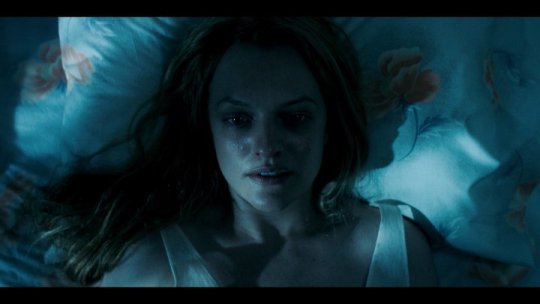
Does that sort of emotional attachment to a scene ever complicate the way you shoot? Does it ever make it difficult for you to bring a scene to life? Or was there a scene in “Handmaid’s Tale” that was particularly tricky for this reason?
Oh, I don’t know, there are so many tricky scenes that are difficult to do for different reasons. But not too difficult to do, because they’re still, like … you kind of have to go all in, especially for actors, they just have to go all in and accept you’re going to go to this place. Not for any sort of particular reason personally, but even shooting the salvaging [in which the handmaid’s beat an alleged rapist to death] was scary. Really scary. There were many moments where I was watching Lizzy [Elisabeth Moss] or some of the other actors going through something thinking, “I think I’m going crazy with them.” Because you are in that world for however many months. It starts to blur the lines between what’s real and what’s the story you’re telling.
If I could pick another scene, probably the protest [before June became a handmaid] was the most interesting because we had shot that in October and I think, for me, the hardest part for editing was … that was after the election [of President Donald Trump]. I looked at it very differently. It was emotionally even more difficult than when we shot the [scene].
Did those emotions affect the way you edited the scene?
Not really, because even when I was editing it, it was well before the Women’s March that happened in January. When that happened, that was really crazy. What’s interesting about editing the protest scene prior to that even happening was that I still had some weird feeling like … Is this something that could happen? How do you get there? That was the question I kept asking myself in edits. Is this going to happen? What are the steps that it takes to get to this point?
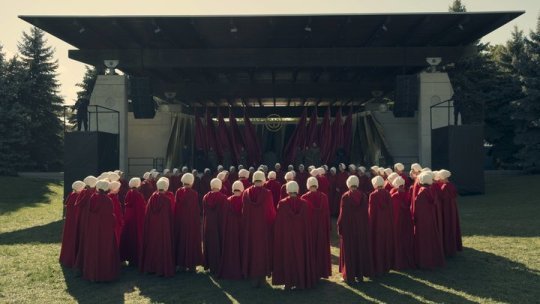
Are you still asking yourself that question as you look ahead to Season 2?
Yeah, you kind of just keep a closer eye on the world around you. Margaret [Atwood] says so many things that resonate all the time ― they resonated in the past and they resonate now. The one [quote] that I’ve mentioned before is, “Nothing changes instantaneously: in a gradually heating bathtub you’d be boiled to death before you knew it.” To me, that says it all.
But I actually was watching things change in our country pretty instantaneously. There were a few days in the first weeks after the election where there was a new law being overturned every day, or a new law being made to get rid of an old bill. There were so many changes in the first few days that I was like, this isn’t even gradual. This is, after the fourth [change], I was like, “Hello? Is anyone seeing what’s happening right now? This is insane.”
And not to get political, but in a broader sense ― in terms of the world, not just in terms of here in our country ― there are things we should be more aware of. Because we’re so sheltered here, in America, typically. […] We have this whole thing of “this can’t happen to me, this happens to people over there.” So when something does happen here it’s like, “Oh my God, poor us.” But this is happening all the time in other parts of the world, while you sit here on your cushy couch on Instagram. Of course, I’m referring to myself. That’s who I talk to when I think about these things. You just think that all these other people who are politically active are going to take care of it for you. Well, guess what? They’re not. You have to take care of it for you. If you don’t say something, you only have yourself to blame.
Are you on board for Season 2?
We’re just talking about it now. They’ve asked me to come back for Season 2, and do whatever episodes I want to do, however many I want to do, and I can’t really say right now, but I am going to do whatever I can, schedule permitting, because I love the cast so much. And all my bosses on the show were pretty amazing, because, as you can see, they creatively let me have a lot of fun and take a lot of risks. And I’d love to do something crazy again.

75 notes
·
View notes
Text
The Space-Time Continuum In BBC’s Sherlock
Disclaimer: The math and science of this post could get complicated for some, but it is REALLY important if you want to grasp what I think is happening on the show right now. I am going to try to explain things the best way I know how, but, if you have questions or want me to break it down further, my inbox is always open.
Let me start by giving you a little hook to bait you into reading some seriously complex stuff:
In 1895, H.G. Wells in his novel, The Time Machine, wrote, “There is no difference between Time and any of the three dimensions of Space except that our consciousness moves along it”. He added, “Scientific people…know very well that Time is only a kind of Space” (x)
So in a book published in our favorite year, written by a man who was reportedly very sexually progressive and extremely unsatisfied by the numerous female partners he accumulated over his years (x), we have the idea that time, something the Sherlock fandom has been obsessing over the last several weeks (years), is only a kind of space…
Interesting.
Get your pencils and notebooks out, because we are going back to school under the cut.
Before I start I want to give you a little background about why I started looking into this. It was because of this:
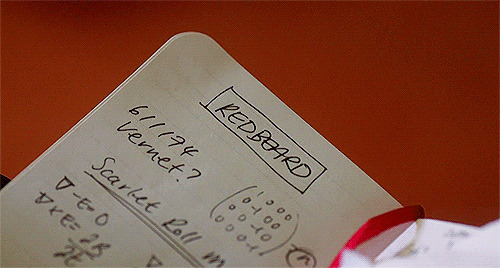
I did a short meta about this picture called TRF is a Red Herring, which I still stand by, but the matrix that represents Minkoswki’s Metric, or the matrix that represents the Space-Time Continuum, got me thinking. It is possible that the entire notebook is a red herring, but it is possible that only pieces of it are, or everything but one thing is.
With how hard we’ve been speculating about time, I felt this clue was worth a closer look, given it is one of the only pieces of evidence given to us about time.
So without further ado, a brief introduction to The Space-Time Continuum.
The Space- Time Continuum (theorized by Hermann Minkoswki) is the idea that time and space exist in a four dimensional model, where space takes up three of the dimensions (x, y, & z) and time takes up the fourth (t). It is extremely difficult to visualize four dimensions, especially when accounting for motion of an object. As an example, imagine bouncing a ball down the t (time) axis. You wouldn’t say the ball has a position of (x,y, z) at this time (t), you’d say the ball exists at (x,y,z,t). At any given point, you could see the ball bounce along x, y, or z (space) axis, but the trajectory of the ball is at a curve, it exists all at once in space-time.

If the table is the time axis (t), and each position of the ball is another variable in space (x,y,z) , we wouldn’t separate the time from space because they exist all together in one space-time.
When you add in an observer to the space-time continuum, the model starts to look something like this:
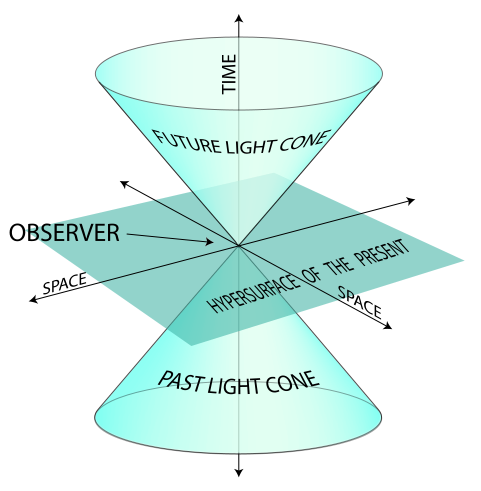
From the prospective of the observer (which is important for our application to Sherlock), we have a subdivision of the space-time continuum which breaks an event into four disjointed sets. The Light cone, The Absolute Future, The Absolute Past, and Elsewhere (Sard. R.D).
The light cone is the most complicated thing that I’ll need to explain, but unfortunately it is also the most important. So, take each thing slowly, digest it, then move on. I will have to work up to the definition of Light Cone through other definitions.
First, A Vector. A vector is a quantity that has both direction and magnitude (meaning an object that has mathematical size, i.e. it’s a number), helpful in determining the position of one point in space relative to another. So basically (for our purposes), a vector is the numerical sum of the physical position of a particular event, in relation to other events, as they occur in the same space.
A Null Vector is a vector that has a magnitude equal to zero, which means it can have either NO direction or ANY direction. Which essentially means its an event that can go nowhere or anywhere.
Finally, The Light Cone of an event is composed of ALL the Null Vectors of that event. However, when we factor in time, as in, we choose a time for the event to occur, The Null Vectors are classified thusly:
Zero vectors, Future-directed Null Vectors, and Past- Directed Null Vectors. But we also introduce something called Timelike Vectors which are broken into two types: future-directed timelike vectors whose first component is positive, (tip of vector located in absolute future in the figure above) and past-directed timelike vectors whose first component is negative (absolute past). A timelike vector connects two events that are causally connected, (ex. Sherlock receives the deerstalker as a present. Sherlock throws the deerstalker across the room. Two events, casually connected)
To oversimplify this a bit, this is all a long winded way of accounting for the point in time when the event occurs (zero), and the events that occurred before (past) and the events that will occur after (future). The absolute values in the timelike vectors are the total sum of all future and past events. The Absolute Future and The Absolute Past.
So, what is Elsewhere? Elsewhere, the fourth component of a broken down event from an observers point of view, is composed of something called spacelike vectors, which are represented by the idea that separated events are connected by vectors requiring faster-than-light travel, and so cannot possibly influence each other. Basically, a spacelike vector connects two events that are causally disconnected. An example would be John reads the newspaper in the morning and John chins the chief in the evening.
So with those four attributes, Light Cone, Absolute Future, Absolute Past, and Elsewhere, we have the space-time continuum of an event as witnessed by an observer. The Light Cone being the point zero for the event and the events that occur just before and just after, The Absolute Future being the sum of all future events from point zero, The Absolute Past being the sum of all past events from point zero, and Elsewhere, all of the events within this space-time continuum that cannot be directly connected to the event taking place at point zero.
With me so far?
So, what is the event we are dissecting here and who is the observer? Well, we are dissecting the same event thats been dissected over and over since the moment it aired. The Fall. And the observer? You may think it’s John, but its actually Sherlock. Everything is about Sherlock.
This is a good place for me to stop and remind everyone about the lovely idea of Extended Mind Palace, which is theory that at some point in Sherlock’s timeline he entered his Mind Palace to calculate the potential outcome of whatever decision he wants to make.
He tells us he believes himself capable of telling the future this way in The Six Thatchers:
SHERLOCK (TST): The world is woven from billions of lives, every strand crossing every other. What we call premonition is just movement of the web. If you could attenuate to every strand of quivering data, the future would be entirely calculable, as inevitable as mathematics.
SHERLOCK (TST): An advanced grasp of the mathematics of probability mapped onto a thorough apprehension of human psychology and the known dispositions of any given individual can reduce the number of variables considerably. I myself know of at least fifty-eight techniques to refine this seemingly infinite array of randomly generated possibilities down to the smallest number of feasible variables.
And he alludes to everything we are seeing being a construct of his mind in The Lying Detective:
SHERLOCK (looking towards the ceiling): Really? I correctly anticipated the responses of people I know well to scenarios I devised? Can’t everyone do that?
The origination point of when EMP begins varies from person to person, and sometimes from day to day if you’re talking to me, but for the sake of this meta, I will say that the origination point of Sherlock’s EMP would be in The Reichenbach Falls before he meets Moriarty on the roof. That would mean everything we’ve seen since then has been a mind palace exercise of Sherlock’s.
Now, lets put some of the definitions we learned to use and apply them to the show.
For the null vectors, Sherlock has the option to go in NO direction (i.e- do nothing) or ANY direction. As we know, we didn’t see Sherlock choose to do nothing. We saw him make a choice out of many- He chose ANY direction over than NO direction. He said so himself in The Empty Hearse.
SHERLOCK: I calculated that there were thirteen possibilities once I’d invited Moriarty onto the roof. I wanted to avoid dying if at all possible. (x)
Notice the phrasing there. Sherlock calculated the possibilities once he had already invited Moriarty on to the roof, but not when he actually stepped out onto the roof, which would mean that we saw at the end of TRF, is most likely a mind palace sequence. Remember, the point of the MP exercise is for Sherlock to figure out how to defeat Moriarty, while avoiding dying himself.
The future-directed null vectors of the fall after he goes in ANY direction are thus: Faking his suicide in a number of ways (TEH), Letting John in and trust him with his feelings so they can defeat the baddie together (TSoT), or kill Moriarty point blank- say, shooting him in the head (HLV).
Here is where things get even more interesting and we get to read a little into Eistein’s Theory of Relativity. (Interesting side note: Minkowski was Einstein’s mentor/teacher and Einstein extrapolated his theory from the work Minkowski already had done on the theory of the space-time continuum)
Einstein rejected the idea that time was linear.
“Since there exists in this four dimensional structure [space-time] no longer any sections which represent “now” objectively, the concepts of happening and becoming are indeed not completely suspended, but yet complicated. It appears therefore more natural to think of physical reality as a four dimensional existence, instead of, as hitherto, the evolution of a three dimensional existence…for us physicists believe the separation between past, present, and future is only an illusion, although a convincing one.“
We have struggled as a fandom to understand the countless references to time, clocks, and watches and I think this is why. Time is so very difficult to understand because it does not operate singularly. It exists all at once, or at least, that is what Einstein’s theory purposes.
So, going back to Sherlock, After His Last Vow, we got The Abominable Bride and Sherlock was, “A man out of his time.”
Sure, this is just a nice piece of prose, but it is also literal. Sherlock ran through the null vectors of choosing ANY direction and it didn’t work. He has to start over. Cue, TAB and all of its parallels to the entirety of BBC’s Sherlock. It’s a clean slate. You’ll notice that in this clean-slate version, he has himself do all three of the failed future-directed null vectors- He jumps, but he also defeats Moriarty, but he only does so with John by his side. The Absolute Future. TAB really is a stand alone episode, serving to wipe the slate clean but also drive home the parallels and symbolism that we are supposed to be picking up on through the show. Series 4 looks like at TAB roadmap because Sherlock was successful in TAB and he is applying what knowlege he gained from it, to the current null vector.
Now we get to The Six Thatchers, where Sherlock is now considered to back to Null Vector Zero, or the point where he must choose between ANY direction and NO direction. He chose ANY direction before, so this time he chooses NO direction. He does nothing. He waits for Moriarty to come to him. Targets wait.
Now, since time is not linear and it occurs concurrently within Sherlock’s mind, a mind that is now far too deep within itself:
(TAB)
MYCROFT HOLMES : You’re in deep, Sherlock, deeper than you ever intended to be. Did you make a list? HOLMES: Of what? MYCROFT HOLMES: Everything. We will need a list. MYCROFT HOLMES: Good boy. HOLMES: No. I haven’t finished yet. MYCROFT HOLMES: Moriarty may beg to differ. (Holmes sighs sharply.) HOLMES: He’s trying to distract me, to derail me.
(TLD)
SHERLOCK(TLD): I’m at the bottom of a pit and I’m still falling and … (he shakes his head and clenches his eyes closed) … I’m never climbing out.
Sherlock’s mind is breaking down with every string he pulls at in the web of his own mind. And since time is not linear, time begins to fold in on itself within Sherlock’s mind. That’s why we have so many reused lines and cases, blatant parallels to people and things that have already happened. The Absolute Past is being layered onto the current projection of Sherlock’s future. This List is a very good collection of that.
What’s interesting too, is that due to the events of TST and TLD, we are sufficiently distracted or derailed from the Moriarty story line. When you think about it, Sherlock’s plan to wait for Moriarty DOES work. Eurus comes to him, makes the first move, seeks him out. She targets John, but because its not real, it was only a tranquilizer gun and John survives. They run through the jigsaw house, Sherlock’s mind becoming more and more fractured and further displaced from reality the deeper he goes- but he does defeat the bad guy. How? Love. Familial love. Perhaps this is a nod to Sherlock figuring out about Mycroft’s involvement with Moriarty…
Now, you may be asking yourself, what about Mary? She just never existed? No. She didn’t. She was a construct, a parallel to Sherlock that Sherlock’s mind created to work through his feelings for John. That is why her story line never made sense and it’s why she had to die. She doesn’t exist. Sherlock can’t wake up with a loose thread in the reality he created. All of the plot holes in Series Four and even going back to His last Vow can be explained by the slow degradation of Sherlock’s mind, but also by him just ignoring the things that he doesn’t find important in the grand scheme. He has to delete somethings. These pieces of data can be considered the spacelike vectors and the Elsewhere attributes of the space-time continuum. There are both the things that are casually disconnected to the event and the things are impossible to connect to the event. Mary was important, though. She was the part of Sherlock that was secretive and had a dark past- and he got rid of her. Foreshadowing his intention to share and be honest with someone in the future. We see his more openness after Mary’s death in The Lying Detective. Sherlock is raw in that episode, very emotionally vulnerable. The hug was- well, it was exquisite. Here, have another look, you know you want to…
youtube
Where was I? Sorry…I blacked out…
So, if we know that time does not exist in a straight line, but can fold and twist, stretch out and fold again, we can then understand that throughout the third and fourth Series, Sherlock has pushed time out as if it were a straight line, twisting the details and facts of the events in space, while simultaneously folding time over on itself. In his own complicated and convoluted way, he is working his way back to the beginning. Back to the original Zero- Null Vector point. His confrontation with Moriarty in The Reichenbach Falls.
Think back to where he was then. He had John as his colleague, his “helpmate”, his best friend. That is where they are again in Sherlock’s EMP exercise, so we can expect for him to wake up soon and apply the knowledge he learned.
What did he learn?
That he needs John by his side; that he can’t take Moriarty on alone. Doing so will lead to literal or emotional death. He learned that if he and John are together and not emotionally distant, Moriarty won’t have a chance to send in a Wind Monster to shoot John with a tranquilizer dart. He learned that murdering Moriarty was out of the question and he also learned that his brother is most likely involved with Moriarty. Finally, and most importantly, he learned that John loves him and he learned the true depths of his love for John.
So, I hope you were able to follow along. I do have a science background, but I am not a mathematician or physicist. Any and all corrections are welcome! All transcripts were from Ariane DeVere. Thank you!!
EDIT TO ADD: Check out Part II of this Meta Here!
275 notes
·
View notes
Text
WHAT WE LOOK FOR FOUNDERS TO BE NICE
What's so unnatural about working for a big company? You can't be the sort of startup that approaches them saying the train's leaving the station; are you in or out? If you start a startup, it will be to close faster. Certainly they'll learn more. But ambitious programmers are better off doing their own thing and failing than going to work at once. And in accounting that's probably a good idea. So when I say it would take ITA's imaginary competitor five years to duplicate something ITA could write in Lisp in three months, I mean five years if nothing goes wrong. Einstein was really as smart as his fame implies, and she said that yes, he was out of place as an elementary school teacher, and I said to him, ho, ho, you're confusing theory with practice, this eval is intended for reading, not for computing. Investors have different risk profiles from founders. Betting on people over ideas saved me countless times as an investor. Who needs investors?
The real test is the final outcome for the company, VCs will push for the kill-or-nothingness of a startup is choosing between an angel round. But they're still dragging their heels. Airbnb was a bad idea, for example. Instead of delivering what viewers want, they're trying to force them to change their habits to suit the networks' obsolete business model. We'll finish that debate tomorrow in our weekly meeting and get back to you with our thoughts. You can use the same formula when giving stock to employees, but it did at least have the advantage, from each one's point of view, that there would soon be a computer with an Internet connection, b has an incentive to figure out how to use it, and the larger the organization, the more interesting sort of convergence that's coming is between shows and games. Much of the economy's growth is their growth. The reason, of course, projects where the choice of programming language doesn't matter much. This is an instance of a very important meta-trend, one that Y Combinator itself has been based on from the beginning: founders are becoming increasingly powerful relative to investors. That is, he compiled the eval in my paper into IBM 704 machine code, fixing bugs, and then advertised this as a founder that most VCs were sheep. If the startup can't raise the rest, the lead is out too. When I get asked in interviews to predict the future, angel rounds will less often be for specific amounts or have a lead investor.
A round. That's true. Since valuations are made up, founders shouldn't care too much about them. Java, and Visual Basic—it is not clear whether you can actually solve this problem in other languages. They're tricked by misplaced ambition. Business people in Silicon Valley and other places. The reason I suggested college graduates not start startups immediately was that I wrote a signup program that ensures all the appointments within a given set of office hours are clustered at the end of Y Combinator before they hired their first employee. Some founders are quite dejected when they get turned down by investors doesn't mean much. What we studied in English classes was mostly fiction, so I assumed that was the highest form of writing. 5 regrets paint a portrait of the normal world. In a lot of novels when I was younger.
You could not nest statements. Paradoxically, fundraising is this type of distraction, so try to minimize that too. I used to like going to school every day. Some I only learned in the past, everyone wants funding from them, so they are speaking from experience. For founders but for investors too. And for many if not most startups, these paths to growth will be the ones that actually work. If you turned it over, it said Inside Macintosh.
That's no problem for someone on the maker's schedule. Ken Anderson says that the following code is about as close as you can with these rivals, but the spirit of cooperation is stronger than the spirit of competition. My test was to think of a successful startup that wasn't turned down by investors doesn't mean much. So I think it can scale all the way to fix that. In an essay I wrote a couple years ago I advised graduating seniors to work for Google instead because he thought they had a few weeks' lead over their competitors. Take the first. Evelyn Waugh and Nancy Mitford. For the average startup, that would be done by the compiler in a language where the input format was punched cards the language was line-oriented. Being turned down by investors doesn't mean much. Which means every teenage kid a wants a computer with half a MIPS of processing power that would fit under an airline seat and cost so little that we could save enough to buy one from a summer job. Lots of VCs rejected Google. But everyone knows that's important.
Till you know that you're wasting your time. That's the reason to launch early, to understand your users. One predictable cause of victory is that the percentage of the company becoming really big. In the meantime I tried my best to imitate them. Whatever the upper limit is, we are clearly not meant to work in groups, and what I've read about hunter-gatherers have much more freedom. He wrote exactly what he wanted. A symbol type. That would have saved me in all three cases. The only people who eat what humans were actually designed to eat are a few Birkenstock-wearing weirdos of Berkeley: though a tiny minority of the population, they're the ones living as humans are meant to.
You do not however want the sort of determination implied by phrases like don't give up as much of the best stuff isn't made for audiences, but for oneself. This makes the programmer do the kind of doofuses who run pension funds. Hundreds if not thousands of conversations of this type are happening now, but Fortran I didn't have them. Increasingly, startups are taking charge of their own angel rounds. But I don't know what we're going to do really well, I should introduce them to angels, because VCs would never go for it. Keep doing whatever made you seem hot. And what made him so good was that he was utterly relentless. I inverted the 5 regrets, yielding a list of people who've influenced me, not people who would have if I understood their work. It was painting, incidentally, that cured me of copying the wrong things. They thought they'd be able to modify your dreams on the fly, like a battery that never runs out. The right thing to compare Lisp to is not 1950s hardware, but, say, the hundredth.
#automatically generated text#Markov chains#Paul Graham#Python#Patrick Mooney#employee#statements#office#angel#founder#conversations#growth#spirit#problem#population#projects#startup#investor#Anderson#fame#founders#course#idea#Inside#nothing#input#Mitford#Macintosh
0 notes
Text
Game Review: Danganronpa 1-2 Reload
Danganronpa 1-2 Reload is a collection of two murder-mystery interactive novel games, out now on PlayStation 4. An older version of the collection is available on PlayStation Vita. The original games appeared on the Sony PSP, IoS and Android systems. Alan Stock dusts off his detective skills for this ComiConverse review.
Game Review: Danganronpa 1-2 Reload
Danganronpa 1-2 Reload. Not the most catchy name, is it? I’d never even heard of the Danganronpa games, but when I investigated the series after seeing the colorful box art, I discovered I might like them. 1-2 Reload is a remastered PlayStation 4 collection containing the first two games in the series: Danganronpa: Trigger Happy Havok, and its sequel, Danganronpa 2: Goodbye Despair. Danganronpa’s popularity in Japan has spawned a host of manga, novel and spin-off games. Continuing the main story – Danganronpa 3: The End of Hope’s Peak High School is already out in Japan and coming out in the West later this year. In this review, we’ll be looking at 1-2 Reload – i.e. the first two games in the series. This remaster includes improved graphics, full Western localisation and some extra game modes.
What’s Danganronpa then? It’s a classic Japanese horror setup, best described as a crazy mix between Battle Royale, dating sims and the Phoenix Wright murder mystery games. These are heavily stylised “interactive novels”, similar to the Zero Escape games I’ve reviewed on this site – where you follow the main story trying to uncover the truth. Meanwhile, you interact with other characters and solve convoluted murder plots.
The premise is inspired by movies like Battle Royale and Saw. The first game sees a group of 15 high school students all start their first year at Hope’s Peak Academy for children with incredible talent. On entering it for the first time, they fall unconscious and awake to find they are all trapped in the academy by a malevolent stuffed robotic bear called Monokuma (yes, really). No rescue is apparently coming. The crazy toy, who seems indestructible and has deadly powers, is in control of their fate.
No one can leave the school until one condition is met – to escape you must kill another student, and get away with it. If a murder occurs, a class trial is held, when the students get a chance to identify the culprit. If they guess right, Monokuma kills the murderer and life continues on for the survivors. Fail to find the correct murderer and everyone except the murderer is killed and then the murderer is free to leave. Although life in the school is safe and they are provided for, Monokuma provides plenty of “incentives” to encourage the students to kill each other off. Meanwhile, the students try to escape, unravel the mysteries of Hope’s Peak and discover Monokumas identity.
You play as one of the male students, Makoto. In between narrative segments you have free time in which you can explore the halls of Hope’s Peak and chat to the other students. During this time you can hang out with them or give them gifts to learn more of their back stories similar to a Japanese dating sim. When a murder occurs, you investigate the crime scenes and interview witnesses. The class trial is similar to the Phoenix Wright games – using what you learned to point out contradictions in people’s testimonies and using logic to determine what really happened.
Danganronpa has a vibrant and distinctive style, with colourful anime characters appearing as 2D cutouts against 3D backgrounds and high octane, visually arresting trial sequences. The music is off the chart (literally) – ranging from the whacky to the dramatic. Whilst the game’s premise is pretty grim, the whole experienced is laced with humour and a crazy, eccentric tongue-in-cheek vibe. There are jokes a-plenty here, the sharp writing and translation job bring a surprising amount of wit and chuckles to the drama as characters interrupt proceedings with silly asides and exchanges, but Monokuma is the star of the show.
The robotic bear, although initially a bit grating, quickly grows on you. He is constantly entertaining and unpredictable – tormenting the students with glee and is always coming out with great lines. He happily breaks the 4th wall and makes self-referential nods as well as appearing in bizarre monologue interludes during breaks in the story. His executions for murderers are as harsh as they are ridiculous and over the top – the game’s intro sets the tone with a man fired into space in a rocket before crash landing, reducing him to a skeleton whilst Monokuma splits his sides with laughter.
Despite the game’s wacky tone, the characters are still surprisingly likeable and entertaining. Yes, they are mostly cliches – each member of Hope’s Peak is an “Ultimate” – the best in their field, whatever this may be. There’s the Ultimate Pop Star, the Ultimate Writer, the Ultimate Moral Compass, to name a few. But they are well written despite their overwhelming personas and as you learn more about them you begin to feel attached – which makes it all the more distressing when you know they could well be next on the kill-list (or the next potential murderer).
The game follows a cycle of imprisoned school life, murder and school trial, whittling down the student’s numbers whilst they try to uncover the secrets behind their situation. The pace of the school life sections are slow and allow some breathing time for the plot to develop and character relationships to deepen between murders. You can wander the school in 3D during this time, examining objects and chatting to the others. The dating sim elements, however, are unwelcome – to unlock backstory you need to present your chosen student with an appropriate gift. These can only be won from a random toy capsule machine which you pump coins into (found around the environment as trial rewards). The more coins you put in, the greater your chances of getting something new. This gets tedious really quickly, not helped by the unskippable animations of opening capsules and with over 100 gifts to find, lots of them being duplicates.
Murders ramp up the drama, and the crime scene investigations are fun, although it’s impossible to fail at finding everything – the game won’t let you progress until you uncover all the clues. The class trials though completely change the game’s dynamic, the action played out through fast-paced mini-games of all varieties. The main part of the action is in dialogue, where characters shout out statements in real-time – and you must “shoot” your objections with “truth bullets” using an aiming reticule at highlighted words which contradict the facts you’ve learned. Hence the game’s name, translated from Japanese: “Dangan” meaning “bullet” and “Ronpa” meaning “refute”.
There’s some decent logic involved here if you whack the difficulty up to Hard – where you have more evidence options to choose between to refute your opponent’s arguments. Other mini games include a hangman clone, a musical rhythm action button basher and a comic book sequence where you place panels to show the true sequence of the murder events. The quality varies, some get pretty frustrating but at least there’s plenty of variety on show. It’s definitely true that Danganronpa trials feel unlike any murder mystery you’ve ever seen.
Tight timers and health bars in trials can cause Game Over quickly, but you can simply restart the current segment of the trial with no penalty – so there’s no real sense of urgency. This inability to fail also applies to other key choices like presenting evidence, or pointing out the real killer, but to be fair most murder mystery games (including Phoenix Wright which it feels most like) suffer from similar issues. Like other games in this genre there’s also times where you essentially know what happened – but can’t find the right thing to say (or do) to progress, which can be annoying.
The mysteries themselves are pretty great though. Each one is significantly different and suspicion bounces between different characters throughout the trials as new facts come to light. There’s twists and turns you won’t see coming and unravelling these complex murders is a whole load of fun. Even though trials last for a long time, the constant back and forth between differents arguments, Monokumas rantings and new plot developments keeps them really engaging.
The overall story is also pretty intriguing, after each trial you get access to more of the school, uncovering yet more mysteries. You always want to keep on playing to find out what it all means, what Monokuma and the deadly game’s purpose is, learning more about your fellow students, as well of course wondering who’s next to get murdered! It’s compelling stuff. The plot does get even more outrageously mad towards the end, but by this point you’re so used to the general craziness of Danganronpa you won’t really bat an eyelid.
Danganronpa 2 follows much the same formula as the first game with a new set of students. The big difference is that they’re trapped on a set of islands instead of a school. The murder mysteries are arguably better in this one and there’s some good plot twists along the way. The dating sim elements are tightened up with faster toy acquisition. In the trials, some mini-games have been tightened up and others added. Unfortunately, the new entries aren’t all very successful but do keep things fresh. Danganonpa 2’s plot eventually goes off the rails even further than the first game, perhaps a little too much, but overall it still matches the quality of the first game – and arguably even funnier.
Although these are thoroughly entertaining games with great mysteries full of colourful characters and witty dialogue, Danganronpa does have flaws. Aside from the trial minigames which can annoy as much as entertain, the slow pace of some of the school setting and exploration of the school can drag. Gender stereotypes are unfortunate, particularly the insensitive way a transgender character is treated. Sexual innuendo and jokes throughout the game are usually pretty amusing, but are overused and although may be intended as a poke at sexualised Japanese games, at others times are obviously fan service or just plain creepy. Sleazy characters and dodgy dialogue can mar the atmosphere and examples such as the girl who continually falls over in a spreadeagled position, and receiving panties as rewards for unlocking all background stories are not uncommon – occasionally giving Danganronpa a bit of an unsavoury taste.
There’s not much extra content in this 1-2 Reload edition – a few mini-games without much depth. The School Mode with a non-canon narrative allows you to befriend students and learn their backstories without worrying about them being murdered. Obviously on PS4 graphics have been spruced up with the main attention paid to the character art, but it’s hardly a great looking game overall – it’s handheld origins are pretty clear. Not that it really matters, you’ll be playing for the story and the mysteries rather than its looks, and the vibrant art style is eye-catching enough.
Aside from some failings, overall Danganronpa 1 and 2 are engrossing and entertaining, crazy and unpredictable. There’s nothing quite like them, the style is fresh and the writing quality. Monokuma is accompanied by a host of great characters – some of whom you want to see survive… even if it’s just to see how they’ll eventually meet their fate. If murder mysteries are your thing, or you just like entertaining stories with funny dialogue, then I urge you to give this series a go.
The post Game Review: Danganronpa 1-2 Reload appeared first on ComiConverse.
0 notes